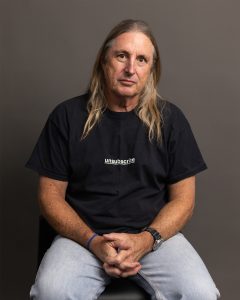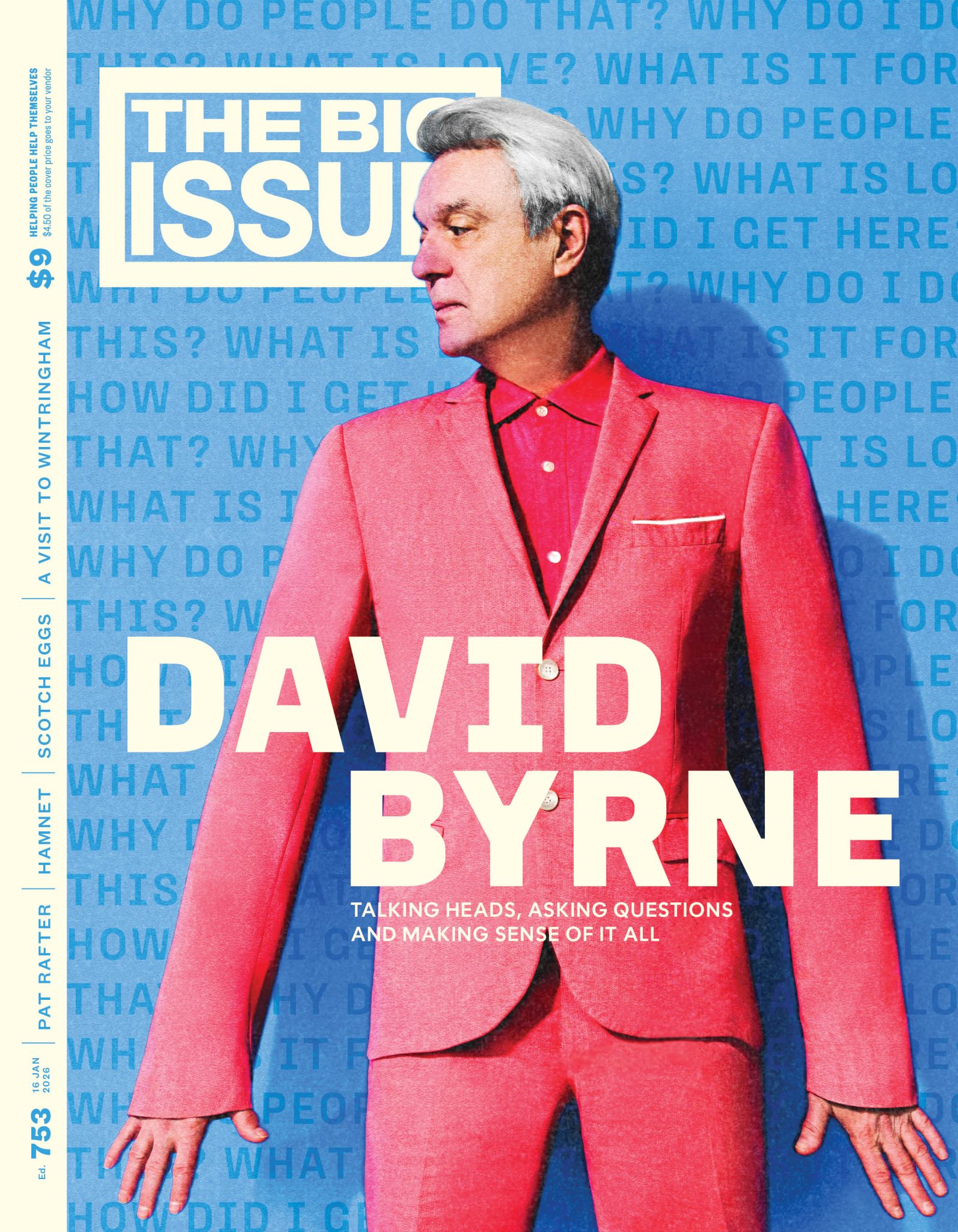Tim Winton has cheered for the Dockers from the very beginning. Thirty seasons on and a whole new generation of Winton rugrats are still waiting for a flag.
At the end of 1993, my wife and I moved with our three small kids from the country to the port of Fremantle. Life in the inner city was a massive change of pace. It took us a while to find our feet.
But our new place was a couple of kicks from Fremantle Oval, and from there you could hear the siren and the roar of the crowd on game day. Footy was our entree into the community, and our timing was perfect because we were there for the birth of something special – the Fremantle Dockers.
The port town has three sacred monuments. One commemorates wharfie Tom Edwards, who was beaten to death by strike-breaking cops in 1919. Another stands in memory of the engineer CY O’Connor who built the harbour. But the one dearest to the hearts of locals is a celebration of football. Standing outside the gates of Fremantle Oval, it’s a tribute to John Gerovich’s towering mark of the century in 1956.
Football has deep roots in Freo. The first game was played there in 1888, and the town’s two teams have long dominated the local competition, so when West Coast joined the AFL in 1987, many portsiders followed them because their team was stacked with Fremantle players like Matera, Jakovich, Sumich and Mainwaring.
But the Eagles were just a franchise. They never represented an actual community. So when news broke in the summer of 1994 that Freo would get its own team in the AFL, locals were euphoric.
The nascent club sent a young marketing dude, Jason Dover, to the primary school down the street to gee up the local kids. Jason, who later became Nat Fyfe’s manager, was tasked with establishing a Junior Dockers Committee to help spread the word and seed a supporter base. My eldest son, who was nine-and-a- half, put his hand up, and so he became our man on the inside.
We loved the nutty new song, the technicolour guernsey, the iconic anchor. And of course, we already knew who Ben Allan and Stephen O’Reilly were, but suddenly we were seeing these stars in the streets and cafes surrounded by a welter of new faces whose names and numbers we didn’t even know yet. The atmosphere in the port’s schools and churches and pubs was feverish.
We were hanging off the fence at the first ever training session in October. We were at the first scratch match with Essendon at East Fremantle Oval the following February. And we were in the front row at the WACA weeks later to see our boys play their first home game.
That warm autumn night, our little boy ran out in team colours as the mascot, alongside Stephen O’Reilly. We were up against a premiership outfit boasting stars like Hird, Wanganeen and the great Michael Long. Our side was game but raw. Coach Gerard Neesham tried to instil a dashing, high-risk style of play that was years ahead of its time – thrilling when it worked, horrible when it came unstuck. We lost narrowly.
The noise of the crowd that night was off the charts. TV commentator Bruce McAvaney suggested that Freo supporters were not at all like those who barracked for West Coast. This did nothing to dampen the Perth–Freo rivalry, and it was uttered before we gave our team a standing ovation for losing. Applauding failure turned into a habit that proved hard to break as the years rolled on, and we put our hearts and hopes into it.
But after a promising start, and some plucky wins, the club found sustained success elusive. Sometimes it felt that our destiny might be to replace Fitzroy as the AFL’s perennial underdog. Finals were never really a consideration.
Our biggest games of the season were the derbies played against West Coast. These drew huge crowds, but they were miserable contests to witness. Freo were bullied mercilessly by their rich and successful crosstown rivals. For a while, winning a derby became the sole focus for Dockers fans. It took us five years to get there, and the victory was sweet.
But the win that broke the team’s insidious inferiority complex was the Demolition Derby of July 2000. This was a turning point for Freo. With that savage spectacle, the Dockers made a statement: they would no longer be intimidated. And Freo has never been the same again. We won that brutal clash by a single point. Defender Dale Kickett was mighty. He copped a nine-week suspension for his efforts, and he’s been a club hero ever since.
It took Freo eight years to play a final. We were flogged by Essendon at Subi. Still, we stood and clapped our boys off the field as if they’d triumphed. Three years later, when we finally won a semi against Melbourne at home, we went berserk. But our joy was short-lived. And there were many more fizzles and fade-outs in the seasons ahead. On the park and in the draft, the Dockers always seemed to find a way to snatch defeat from the jaws of victory.
And the fans? Well, the long years of disappointment hardened us. In 2013 when our talent-packed team reached the Grand Final at long last, we were at the G to urge them on. But our boys were completely overawed and outplayed. When the final siren sounded, we did not laud them in defeat the way we once had. We were past all that nonsense. Now we’re in our 30th season. Still no flag. And my kids have rugrats of their own. Do they fly the flag? You bet.
The passion of Freo’s supporters is as fierce as ever. But we’re more sceptical now. We’re alert to complacency and impatient with mediocrity. After decades of dashed hopes, we yearn for excellence and consistency. And we’re still waiting. I guess that makes us a special breed.
Yes, we’re the oldest outfit in the league to never win a flag. And our legacy of self-harm in trade negotiations is unrivalled. And, yes, the club’s association with corporate polluter Woodside is embarrassing. But these flaws are not what distinguishes Freo. We love our team because it still draws us together in common cause. It softens the barriers between us. It represents a community that’s been fostering solidarity, from the wharf to the goal square, for generations.
And in a sport disfigured by racism, our team is a beacon of decency and respect. No other AFL club has showcased the talent and culture of as many Aboriginal players as Freo. This has made it a genuine force for good. Those players have been role models for their own communities, but perhaps more significantly, they have educated and elevated non-Indigenous supporters along the way. This is what I’m proudest of, what I’m grateful for. That’s why I stay loyal.
Sure, the club has its greats like Bell, Modra, Pavlich and Fyfe, but Freo’s Indigenous players are its crowning glory. Think of the wild innovations of Winston Abraham, Scott Chisholm and the late Gary Durrkay, the liquid grace of Michael Johnson, Roger Hayden and Bradley Hill. Remember the grit of Antoni Grover and Troy Cook. Think of the otherworldly genius of Jeff Farmer, Michael Walters and Shai Bolton. Consider the intelligence and moral authority of our captain, Alex Pearce.
And remember, please remember, the courage and selflessness of Dale Kickett. He’s the man who broke Freo’s fear. For mine, he’s the best we ever had. He let us believe that better days are possible.
Tim Winton is the author of 30 books. Named a National Living Treasure in 1997, he is the patron of the Australian Marine Conservation Society.

Illustration by Lauren Rebbeck
Want more of The Big Issue?
Subscribe to The Big Issue magazine to enjoy powerful journalism, stories from our vendors, and more — all delivered straight to your door.
Subscribe now.
